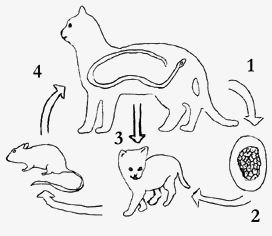Feline Roundworm Infections: Roundworms in Cats
These intestinal parasites are often found in young puppies and kittens. They measure two to six inches in length and look like very thin pieces of spaghetti. Roundworm infections often cause kittens to appear pot-bellied or bloated, anemic, have diarrhea, weight loss and vomit. The kittens are often less lively and do not grow as well as uninfected kittens. Coughing is also an occasional symptom of roundworm infections.


Since the parasites can travel from the mother to the unborn, kittens are often born with roundworms. Young kittens can also become infected while nursing. (Roundworm larvae are passed in the mother's milk.) Adult cats become infected by ingesting material contaminated by feces or by ingesting small rodents. (Rodents are carriers of roundworms.) After hatching in the cat's intestine, roundworm larvae are carried by the bloodstream to the lungs. From the lungs, the larvae crawl up the windpipe and are swallowed. Once the larvae are in the intestine, they grow to adulthood. Coughing occurs when larvae are in the throat.
Accurate diagnosis of roundworms is important since they can cause serious problems. Kittens can die from severe roundworm infections. A one month old kitten should have his (or her) stool examined for roundworms. As a precautionary measure, many veterinarians routinely treat young kittens for roundworm infections.
At the time of kitten vaccinations, stool examinations should be performed. Adult cats should have a stool sample examined for worms at least twice a year (Spring and Fall). Anytime a cat has a digestive tract problem, a stool exam can detect or rule out the presence of internal parasites.


A stool examination performed at a veterinary hospital not only detects the presence or absence of adult worms, it also detects the presence of worm eggs. The feces are mixed with a special chemical solution, and after several minutes, the solution is examined under a microscope. If worm eggs are seen, the veterinarian, or a trained technician, can identify the specific worm. The appropriate medication is then dispensed in order to eliminate that particular worm.
When bringing a stool specimen to the veterinary hospital, it is best to transport it in a small ,clean glass jar. A fresh specimen is definitely best. An old specimen may no longer contain the parasite or the eggs.
Stool examinations are an inexpensive method of detecting internal parasite infections in cats. Early detection and accurate treatment prevents these parasites from causing intestinal disorders. Along with vaccinations and regular check-ups, stool exams are considered part of the routine pet care given to all cats.

